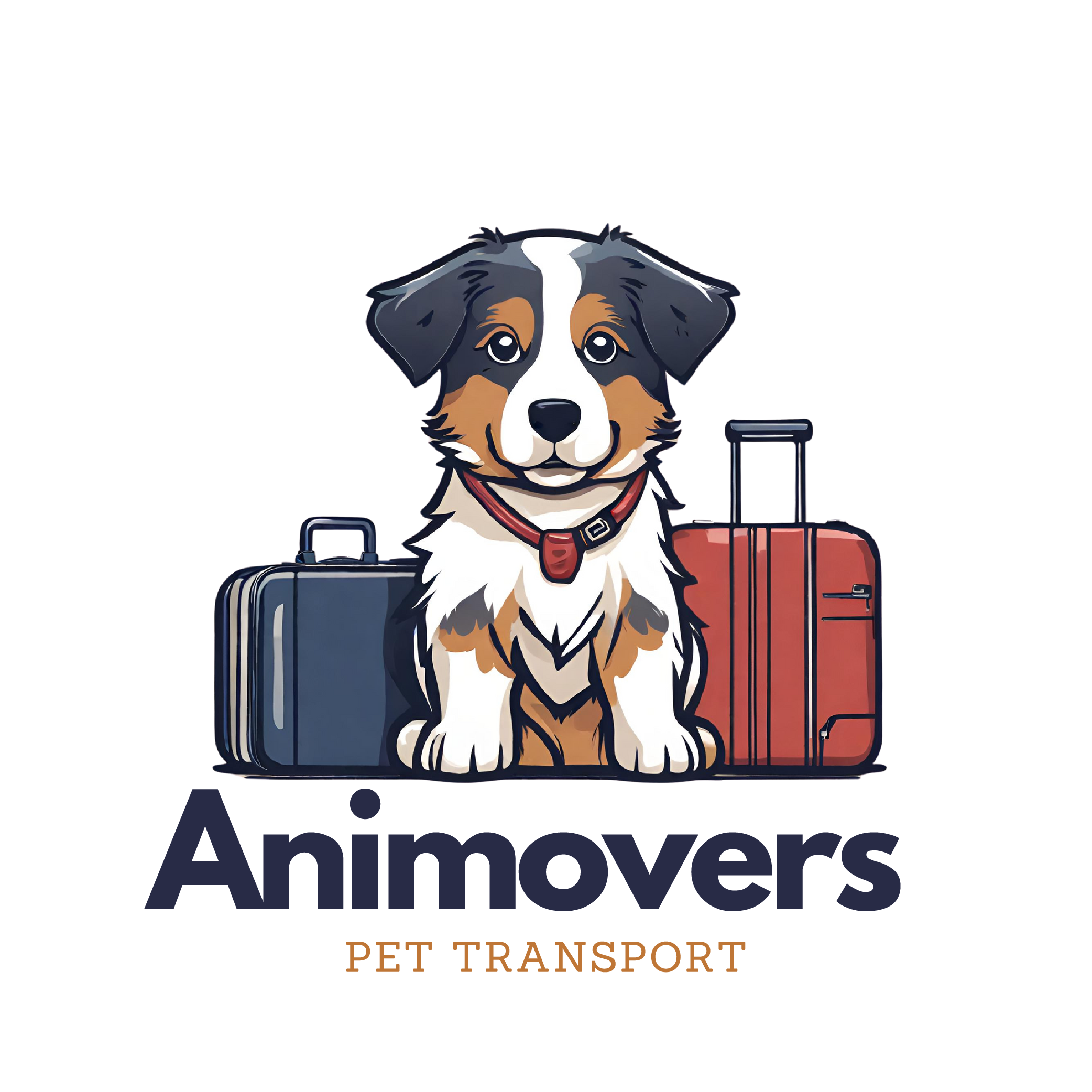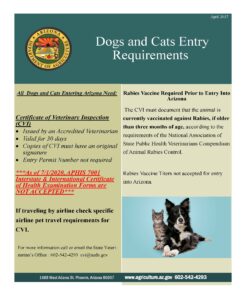
Transport Requirements
US Interstate Pet Transport

General Transport Requirements
Listed here are the minimum requirements for transport according to Animal Welfare Act (7 U.S.C. §2131). Your origin, transit or destination may have addiitonal requirements.
Must have health certificate
No dog, cat, nonhuman primate, or additional kinds or classes of animals designated by USDA regulations shall be delivered to any intermediate handler or carrier for transportation in commerce unless accompanied by a health certificate executed and issued by a licensed veterinarian (7 U.S.C. 21.43.9; CFR, Subchapter A, Part 2).
Must be at least 8 weeks old
No dogs or cats, or additional kinds or classes of animals designated by regulation of the Secretary, shall be delivered by any person to any intermediate handler or carrier for transportation in commerce except to registered research facilities if they are less than such age as the Secretary may by regulation prescribe. The Secretary shall designate additional kinds and classes of animals and may prescribe different ages for particular kinds or classes of dogs, cats, or designated animals, for the purposes of this section, when he determines that such action is necessary or adequate to assure their humane treatment in connection with their transportation in commerce.
No COD arrangements
No intermediate handler or carrier involved in the transportation of any animal in commerce shall participate in any arrangement or engage in any practice under which the cost of such animal or the cost of the transportation of such animal is to be paid and collected upon delivery of the animal to the consignee, unless the consignor guarantees in writing the payment of transportation charges for any animal not claimed within a period of 48 hours after notice to the consignee of arrival of the animal, including, where necessary, both the return transportation charges and an amount sufficient to reimburse the carrier for all out-of-pocket expenses incurred for the care, feeding, and storage of such animals.
Requirements vary by destination state. Information provided on this page is taken directly from the relevant state authority websites and is provided for informational purposes only. We will provide all contracted clients with step by step requirements. If you have any questions, please contact the relevant authority directly. Contact information is provided below for the majority of states.

Alabama
All domestic animals and poultry entering the State of Alabama must conform with Alabama’s requirements contained herein and be in compliance with Federal regulations.
All dogs and domesticated cats to be moved or transported into Alabama for any purpose shall be accompanied by an official Certificate of Veterinary Inspection showing that the animals have been officially vaccinated against rabies and identified by vaccination certificates and tags bearing serial numbers not more than one (1) year prior to shipment. Puppies and domesticated kittens under 3 months of age may be admitted without vaccination.
This section does not apply to any dog or cat which is imported into the state for exhibition purposes and which does not remain in the state for more than 21 days. No dog or domesticated cat infested with screwworms shall be shipped or otherwise imported into Alabama for any purpose.
NOTICE
The Alabama Department of Agriculture, State Veterinarian has decided to stop accepting Interstate Certificate of Veterinary Inspection (ICVI), APHIS-VS form 7001 for small animals entering Alabama.
Effective January 1, 2019, APHIS form 7001 “United States Interstate and International Certificate of Health Examination for Small Animals” is no longer approved for interstate movement of small animals into Alabama by the Alabama Department of Agriculture and Industries (AGI). Please be aware that numerous other states are no longer accepting the online-only form, due to its free access to the public for downloading off the internet without any accountability as to who uses the form.
An Interstate Certificate of Veterinary Inspection (ICVI) is an official document issued by an accredited veterinarian certifying that the animal destined for interstate movement is healthy at the time of the veterinary inspection.
Alabama licensed and accredited veterinarians may purchase ICVI booklets by contacting our office at 334-240-7255. Alabama currently accepts electronic ICVI’s provided by Global Vet Link and AgView.
Follow this link to Alabama Department of Agriculture and Industries website.
Alaska
A person may not import or transport any animal into Alaska which is affected by an infectious or communicable disease, or which has been exposed to an infectious or communicable disease.
All animals are required to have a current Certificate of Veterinary Inspection (CVI) or Health Certificate to enter the state of Alaska.
NOTE: The State does not accept the downloadable USDA 7001 form available on the internet, since this document does not have a unique and trackable identification number. The veterinarian may use an electronic health certificate from one of several contractors (Global Vet Link, New Planet Technologies, Vet-Sentry) or a paper copy of the USDA VS 7001 Form since this has a certificate number printed on the form. The veterinarian may also be able to use the Animal Health State Certificate available from their State Veterinarian as long as the document has a certificate number to ensure that the document is original and is traceable.
The veterinarian issuing the CVI must submit a copy by mail (5251 Dr. Martin Luther King Jr. Avenue Anchorage, AK 99507), or email ([email protected]) a scanned copy in PDF format to our office.
Certain species of animals will require an import permit. Permits may be obtained by the veterinarian issuing the health certificate by filling out an online application or by calling (907) 375-8215.
Alaska Division of Environmental Health State Veterinarian Website.
Arkansas
Arkansas Department of Agriculture website does not list any additional requirements for pet transport. Animal Welfare Act and USDA APHIS regulations still apply.
California
Domestic dogs
Current rabies vaccination certificate for dogs over four (4) months of age.
Domestic dogs changing ownership in California (including dogs planning to be sold to new owners in California)
Current rabies vaccination certificate for dogs over four (4) months of age, and
A health certificate (also known as a Certificate of Veterinary Inspection (PDF))*
Health certificates must be:
Completed no more than 10 days before the date the dog arrives in California
Sent to the county health department before the dog arrives in the county where the dog is to be sold, or in the county of residence of the person who is receiving the dog
Domestic cats
No documents are required for pet/domestic cats entering California.
Colorado
*Please note, the VS Form 7001 is NOT accepted as a CVI for interstate travel to Colorado for any small animals.
Certificate of Veterinary Inspection (CVI) issued by an accredited veterinarian within 30 days prior to entry and stating that the dogs are free from exposure to rabies. Dogs imported into PACFA Licensed Facilities are required to have a CVI within 10 days of entry.
Rabies vaccination current, for all dogs greater than 3 months of age
**For Colorado Origin animals traveling to states that do not require a CVI and returning to Colorado:
If return to Colorado is within 30 days from departure, no CVI is required for return
If return to Colorado is greater than 30 days from departure, a CVI will be required to return to Colorado
Connecticut
Any dog or cat imported into this state shall be accompanied by a certificate of health issued no more than 30 days prior to entry by a licensed veterinarian and approved by the proper livestock sanitary official of the state of its origin, stating that such dog or cat is free from clinical signs of any infectious, contagious, or communicable disease, and that such dog or cat is not from an area
under quarantine for rabies.
Dogs or cats over 3 months of age must have proof of current rabies vaccination given by a
veterinarian prior to the date of importation and must not have been exposed to rabies within the past 100 days.
Any person from another state may import any licensed dog with collar and tag and keep the same in this state for not more than thirty days without also licensing the dog with a town in Connecticut.
No person firm or corporation shall import or export for the purposes of sale or offering for sale any dog or cat under the age of eight weeks unless such dog or cat is transported with its dam and no person firm or corporation shall sell within the state any dog or cat under the age of eight weeks. Any person firm or corporation violating the provisions of this section or bringing any dog into this state from an area under quarantine for rabies shall be fined not more than $1000.
CT Department of Agriculture Office of the State Veterinarian website.
Delaware
10.0 Dogs
10.1 In addition to the General Requirements, all dogs shall meet the following requirements:
10.1.1 Animals over four (4) months of age shall be adequately vaccinated for rabies and
10.1.2 The type of rabies vaccine used for immunization and the date of administration shall be included on the official health certificate and
10.1.3 Animals shall not originate in a rabies quarantined area.
11.0 Cats
11.1 Cats may enter Delaware when accompanied by an official health certificate stating that said animals are free of any infectious or contagious disease or exposure thereto.
11.2 All cats 6 months of age and older must be adequately vaccinated for rabies.

